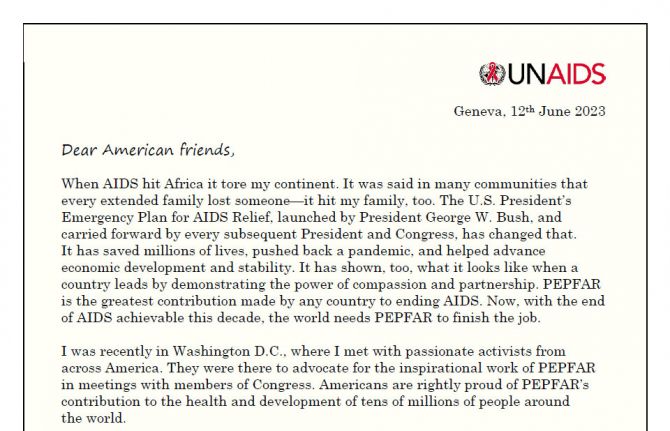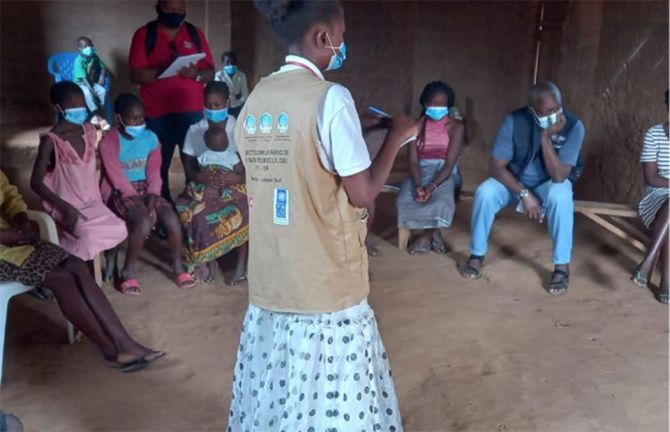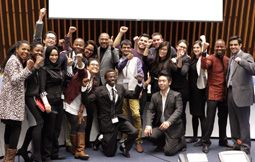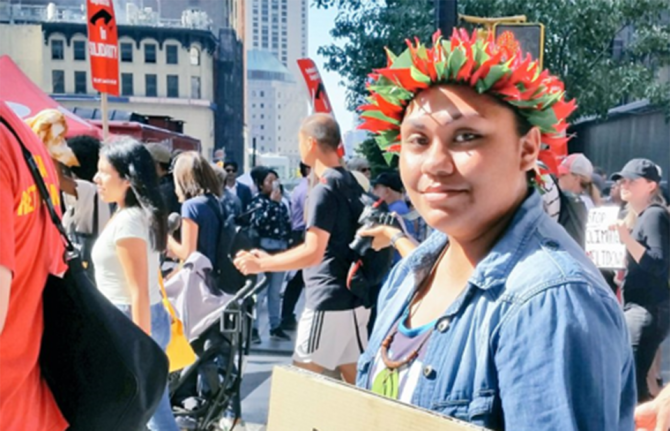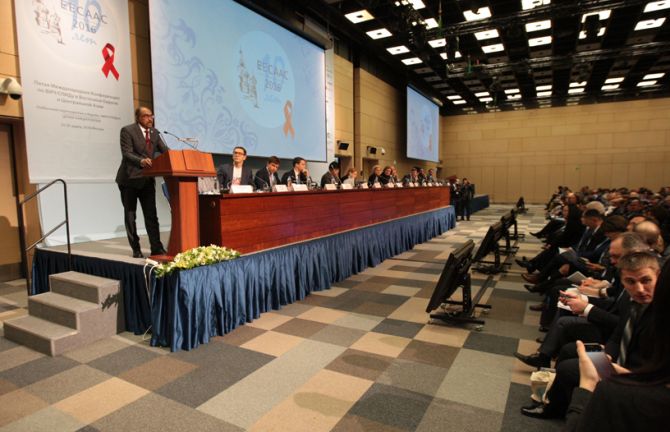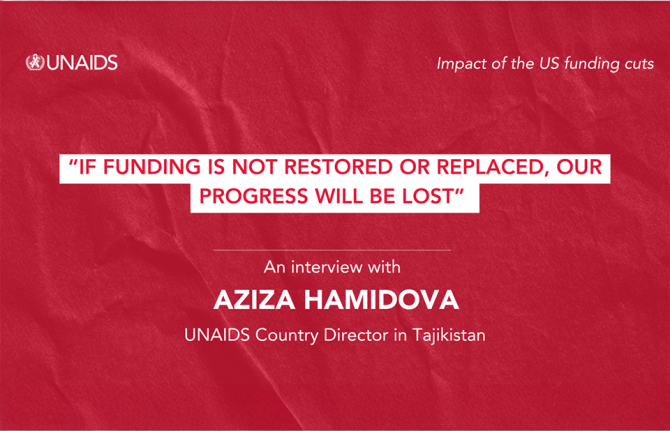
Feature Story
Senate vote renews US government’s global AIDS programme PEPFAR
17 July 2008
17 July 2008 17 July 2008
Credit: President's Emergency Plan for
AIDS Relief
The US Senate has voted on legislation authorizing US$ 48 billion for AIDS, TB and malaria over the next five years. The legislation will replace and expand three-fold the current US$ 15 billion act passed by Congress in 2003 which expires at the end of September.
U.S. President George W. Bush announced the President's Emergency Plan for AIDS Relief (PEPFAR/Emergency Plan) in a State of the Union address in 2003. It was the largest commitment ever by a country for an international health initiative dedicated to a single disease.
There are 15 focus countries in sub-Saharan Africa, Asia and the Caribbean being assisted by the PEPFAR.
Senate vote renews US government’s global AIDS pr
Press centre:
UNAIDS welcomes United States Senate action to renew its global AIDS programme (16 July 2008)
Statement on PEPFAR reauthorization vote by full US House of Representatives (03 April 2008)
UNAIDS welcomes call for $30 billion to the AIDS response (30 May 2007)
External links:
Related

Feature Story
New UNAIDS policy on HIV and international labour migration
16 July 2008
16 July 2008 16 July 2008
Recent estimates indicate that 86 million
people across the world are international
labour migrants.
Photo: ILO/UNAIDS/H.J.Davis
Recent estimates indicate that 86 million people across the world are international labour migrants. Migrant workers bring huge benefits to their families and countries of origin through remittances – the sending of money home; and to their countries of destination by contributing to the workforce, economy and society in which they live. Yet at the same time, migrant workers face particular risks and vulnerabilities to HIV which must be addressed.
UNAIDS, in collaboration with the International Labour Organization (ILO) and International Organization for Migration (IOM) have developed a policy brief focusing on the HIV-related needs and rights of international labour migrants, irrespective of their legal status and whether their stay in the destination country is short or long term.
HIV risk
Migrant workers often experience isolation and stress as a result of being separated from their families and communities, or perhaps having to deal with harsh working and living conditions. These factors can lead them to engage in behaviours which increase their risk of HIV, such as unsafe commercial or casual sex. Wives and partners of migrant workers who stay in their home countries may also be put at risk of HIV, for example if their husband returns home HIV positive. Yet businesses which employ migrant workers can and are doing things to alleviate some of these risks.
“We have made good progress towards providing family-friendly accommodation or housing allowances, so that migrant workers can bring their families with them if they wish,” notes Brian Brink and Edward Bickham of AngloAmerican, a global mining company with employees in countries hard hit by HIV such as South Africa.
International labour migration and people living with HIV

Migrant workers, irrespective of their HIV
status, need to be able to access culturally
and linguistically appropriate HIV
programmes in origin, transit and destination
countries. Photo: ILO/UNAIDS/J.Maillard
International labour migrants who acquire HIV in transit or destination countries, or who are already living with HIV, often don’t have adequate access to HIV and health services. Migrant workers, irrespective of their HIV status, need to be able to access culturally and linguistically appropriate HIV programmes in origin, transit and destination countries.
Governments, civil society, businesses, employee organizations and international organizations all have a role to play in addressing HIV among migrant workers.
“Working abroad is full of challenges and threats – and one of the threats is HIV,” notes Nerissa Mercado of the Overseas Workers Welfare Agency in the Philippines. “We must help ensure our overseas Filipino workers come home with success stories and are HIV free; after all, their sacrifices help keep the economy afloat. We must likewise assist them if they do become HIV positive”.
Migration and human rights
More than 100 countries place restrictions on people living with HIV in entering or remaining in a country for any purpose, and international labour migrants may be refused entry or face deportation if they are found to be HIV positive. Where HIV testing occurs in the context of migration, internationally agreed standards on informed consent, confidentiality, counselling and referral to services are not routinely applied. Furthermore, international labour migrants receiving anti-retroviral treatment in the destination country may also have their treatment disrupted by deportation, if they do not have access to HIV and health services in their home countries.
International labour migrants, whether in regular or irregular status, should have the same human right to health as nationals. Respecting and promoting their health is essential for achieving national and international public health goals such as universal access to HIV prevention, treatment, care and support, as well as improving the productivity and economic independence of individuals and families.
New UNAIDS policy on HIV and international labour
Cosponsors:
International Labour Organization (ILO)
%Partners:
International Organization for Migration (IOM)
%Press centre:
Statement of the UNAIDS Secretariat to the Sixty-First World Health Assembly - Health of Migrants (21 May 2008)
Feature stories:
European meeting discusses migration, TB and HIV (15 October 2007)
Publications:
UNAIDS Policy brief - HIV and International Labour Migration (UNAIDS, ILO, IOM) (pdf, 206 kb)
Expanded version: UNAIDS Policy brief - HIV and International Labour Migration (UNAIDS, ILO, IOM) (pdf, 210 kb)
Related
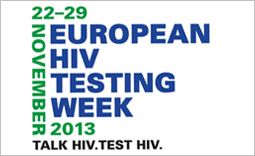 Know your HIV status: First European testing week takes off
Know your HIV status: First European testing week takes off

27 November 2013

Feature Story
Ballack captains “Goal4Africa” team
14 July 2008
14 July 2008 14 July 2008
UNAIDS Special Representative Michael
Ballack participated in the “Goal4Africa”
all-star benefit football match Munich on
12 July to raise funds for education in Africa
Credit: Goal4Africa
UNAIDS Special Representative Michael Ballack participated in the Goal4Africa all-star benefit football match held at Allianz Arena in Munich, Germany on 12 July in honour of Nelson Mandela’s 90th birthday. The event was lead by Goal4Africa Ambassador and international football star Clarence Seedorf and broadcast live in many countries worldwide.
Speaking at a press conference before the match, Ballack highlighted how educating young people about HIV prevention is crucial in the AIDS response.

Spectators, fans and television viewers
made donations for each goal scored by
their favourite player via SMS text message
and online on the Goal4Africa web site.
Credit: Goal4Africa
Ballack was team captain of the winning side in an all-star international game which included some of the world’s best football players including Zé Roberto, Gennaro Gattuso and Andriy Shevchenko and Formula1 legend Michael Schumacher.
Spectators, fans and television viewers made donations for each goal scored by their favourite player via SMS text message and online on the Goal4Africa web site. Funds raised will go to education projects in Africa
Michael Ballack, as UNAIDS Special Representative, reaches out to young people by educating on HIV and urging young people to make smart prevention choices.
Ballack captains “Goal4Africa” team
External links:
Related
 “Who will protect our young people?”
“Who will protect our young people?”

02 June 2025

Feature Story
Strong HIV and Human Rights Activist appointed as new UN Special Rapporteur
11 July 2008
11 July 2008 11 July 2008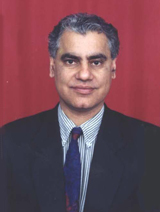
Anand Grover, head of the HIV/AIDS
Unit of Lawyer’s Collective (India)
and a member of the UNAIDS
Reference Group on HIV and
Human Rights
Anand Grover, head of the HIV/AIDS Unit of Lawyer’s Collective (India) and a member of the UNAIDS Reference Group on HIV and Human Rights, has been appointed the Special Rapporteur on the right of everyone to the enjoyment of the highest attainable standard of physical and mental health by the UN Human Rights Council.
A well-known long-time advocate and activist on HIV and human rights, Anand Grover is a practicing lawyer in the Bombay High Court and the Supreme Court of India. He has argued many cases relating to the rights of people living with HIV, including rights of sex workers and the first HIV case in India relating to employment law.
Mr. Grover has worked closely with UNAIDS on HIV-related rights and law issues for many years and has been a valuable resource for the Programme. In this regard, he has served on the UNAIDS Reference Group on HIV and Human Rights which advises UNAIDS on how it can strengthen the commitment and capacity of governments, civil society and the private sector to protect and promote human rights in relation to HIV. At the request of the Government of India, Anand Grover and the Lawyers Collective HIV/AIDS Unit drafted the HIV Bill which is likely to be introduced in Parliament this year.
Mr Grover takes over from Paul Hunt, who has been the Special Rapporteur since the mandate was created in 2002 and has completed his maximum term of six years. Paul Hunt is also a member of UNAIDS Reference Group on HIV and Human Rights. In his country visits and reports to the Human Rights Council, Mr Hunt has been a great champion of human rights issues related to HIV.
Susan Timberlake, UNAIDS Senior Human Rights and Law Adviser, believes that UNAIDS engagement with Special Rapporteurs is an important way to bring greater attention to HIV-related human rights issues globally and in countries.
“We are delighted at the appointment of Anand Grover to UN Special Rapporteur on the right of everyone to the enjoyment of the highest attainable standard of physical and mental health. A tireless HIV and human rights activist, he will no doubt continue the pioneering work of his predecessor Paul Hunt. We look forward to working closely with him to help ensure the full realization of the human rights and fundamental freedoms that are critical to a successful response to HIV.”
Special Rapporteurs
Special Rapporteurs are independent experts that serve in their personal capacity, supported by the Office of the UN High Commissioner for Human Rights (OHCHR). They undertake country missions at the invitation of a country or on the basis of a standing invitation. During such country missions, they assess the general human rights situation, as well as specific issues under their respective mandates. They meet with national and local authorities, including judges and parliamentarians; the national human rights institution; the UN and other inter-governmental agencies; the media and victims of human rights violations.
On the basis of their findings, they present conclusions and recommendations through public reports to the UN Human Rights Council, and to the concerned governments. Special Rapporteurs also have a mandate to take up individual cases of human rights violations which they address directly to the Minister of Foreign Affairs in a country.
More information about the mandate of the Special Rapporteur on the right of everyone to the enjoyment of the highest attainable standard of physical and mental health (including reports of country missions and summaries of communications to governments) can be found on the OHCHR web site
Strong HIV and Human Rights Activist appointed as

Feature Story
The UN Secretary General visits Red Ribbon Centre Beijing
09 July 2008
09 July 2008 09 July 2008
During his official visit to China, the UN
Secretary General and his wife Madame
Yoo Soon-taek paid a visit to Ditan hospital
in Beijing. Photo: UNAIDS
During his official visit to China, the UN Secretary General and his wife Madame Yoo Soon-taek paid a visit to Ditan hospital in Beijing on 2 July to discuss a range of issues with people living with HIV and meet the staff and volunteers who work at the hospital.
The Beijing Ditan hospital, established in 1946, specializes in infectious diseases and is one of China’s leading institutions providing treatment and care for people living with HIV. Affiliated with the hospital is the Red Ribbon Centre which compliments the hospital’s work by providing care and psychological support to people living with HIV.
The centre provides a number of services including information, HIV testing and counselling, as well as training for volunteers and a legal aid system to advise people living with HIV. It is a place where HIV positive people can network, and above all, be themselves without fear of stigma.
During his visit the Secretary General said that HIV remained at the top of his agenda and praised the work of the volunteers at the Red Ribbon Centre. In his conversations with those living with HIV he was keen to discuss how stigma and discrimination impacts their lives, an issue he covered in his recent remarks at General Assembly High-level Meeting on AIDS New York on 10 June 2008.
A mother, who gave birth three weeks ago and who is HIV positive was one of the people with whom the Secretary General met. They discussed how testing positive for HIV had influenced her life, her current health status and the treatment she and her baby receive in Ditan hospital.
The Secretary General and Madame Yoo Soon-taek were accompanied on the visit by officials representing the UN in China.
The UN Secretary General visits Red Ribbon Centre

Feature Story
Examining links between AIDS and climate change
07 July 2008
07 July 2008 07 July 2008 The AIDS epidemic and the climate change phenomenon are two of the most important “long wave” global issues of the recent past, present and future. They share similarities, interactions, and present possibilities for a more united response. Yet, these links have received little analysis so far.
For that reason, several UN agencies, research institutes from Switzerland, India, South Africa and Canada as well as the International Federation of Red Cross and Red Crescent Societies gathered to analyse the existing links between AIDS and climate change in a technical meeting held in Nyon, Switzerland, on 20 May 2008.
Furthermore, a joint position paper on AIDS and climate change was commissioned by UNEP and UNAIDS from the Australian National University in February 2008. This paper, whose findings where also discussed at the Nyon meeting, focuses on scientific issues, identifying major, minor, and speculative pathways by which HIV and climate change are likely to interact.
Read summary report of the technical meeting on AIDS and climate change (pdf file)
Examining links between AIDS and climate change
External links:
Publications:
Summary report of the technical meeting on AIDS and climate change (pdf)

Feature Story
UNAIDS and Kaiser Family Foundation release new report assessing funding for AIDS by G8 countries and other major donors
06 July 2008
06 July 2008 06 July 2008 As world leaders prepare to meet in Hokkaido, Japan for the annual meeting of the G8, the Joint United Nations Programme on HIV/AIDS (UNAIDS) and the Kaiser Family Foundation have released a new report analysing the funding available for AIDS from G8, European Commission (EC) and other donor governments in 2007.
As world leaders prepare to meet in Hokkaido, Japan for the annual meeting of the G8, the Joint United Nations Programme on HIV/AIDS (UNAIDS) and the Kaiser Family Foundation have released a new report analysing the funding available for AIDS from G8, European Commission (EC) and other donor governments in 2007.The report shows that assistance for AIDS from donor governments to low- and middle-income countries is being driven by a subset of G8 members and notably some non-G8 members such as the Netherlands, Sweden, Australia and Ireland. In 2007, the United States was the largest donor for AIDS, followed by the UK and the Netherlands, using bilateral and multilateral channels.
Financing an effective and sustained response to the AIDS epidemic in low- and middle-income countries has emerged as one of the world’s greatest challenges. International assistance from donor governments, through bilateral aid and contributions to the Global Fund to Fight AIDS, Tuberculosis and Malaria, as well as other financing channels is a critical part of the response.
In 2005 at the summit in Gleneagles leaders of the Group of Eight pledged to commit US$ 25 billion per year to aid in Africa, part of which is to go to working towards the goal of universal access to HIV prevention, treatment, care and support.
Some key findings of the report include:
- In 2007, international AIDS assistance from the G8, EC, and other donor governments reached its highest level ever with commitments totalling US$ 6.6 billion up from US$ 5.6 billion in 2006.
- Between 2002 and 2007, commitments and disbursements each increased by at least four-fold.
- In 2007, donor governments disbursed US$ 4.9 billion for HIV/AIDS, including US$ 3.7 billion in bilateral assistance and earmarked multilateral funds and an additional US$ 1.2 billion through the Global Fund to Fight AIDS, Tuberculosis and Malaria.
The full report is available online here or on the Kaiser Family Foundation website
UNAIDS and Kaiser Family Foundation release new r
Partners:
Press centre:
Universal access 2010 remains priority for G8 leaders (9 July 2008)
Publications:

Feature Story
Preventing HIV, preserving the environment
01 July 2008
01 July 2008 01 July 2008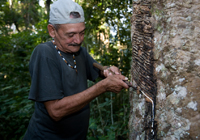
The condoms factory uses natural latex
collected by local rubber tappers and it
will be able to supply the Brazilian
government with 100 million condoms a
year. Photo credit: UNAIDS/J.Spaull
The use of condoms in Brazil is preventing the spread of HIV and it might also be helping to save the rainforest thanks to a condom factory opened in April in the Amazon region. This unique factory uses natural latex collected by local rubber tappers and it will be able to supply the Brazilian government with 100 million condoms a year.
The company which runs the factory – Natex - is a joint venture between the local state of Acre, the Ministry of the Environment and the Ministry of Health. It represents Acre’s new vision for the Amazon - “Florestania” - which seeks to increase the living standards of its inhabitants whilst also preserving the rain forest, through increasing the value of the products extracted from it.
The factory is located in Xapuri, made famous by the environmentalist and rubber tapper Chico Mendes who was assassinated there twenty years ago, and it is a direct legacy of his life’s work. Threatened with the destruction of their livelihood by the cattle ranchers who were clearing the forest, Mendes’s great achievement was to forge an alliance between the interests of the rubber tappers and the environmentalists. Mendes saw the rubber tappers as the natural custodians of the forest.
The factory provides employment for around 100 people and the latex is supplied by around 700 rubber tappers. As well as payment for the latex, the rubber tappers receive a fee for “environmental services”, recognising their importance in safeguarding the forest. This has greatly improved the living conditions of rubber tappers such as Chico Mendes’s cousin Sebastiao Teixeira Mendes who gets a guaranteed income for his latex which is higher than he could get elsewhere. He sees the rubber tappers as the “soldiers of the forest – patrolling and managing the forest”.
At the opening of Natex, the then Minister of Environment Marina Silva - the daughter of rubber tappers herself – was in no doubt of the significance of the factory: “This is a project where high technology will help to preserve the soul of the forest”. Adding, “The forest will remain the forest and the rubber tappers will remain rubber tappers through a new way of working and producing”.
As well as the environmental and social aspects of the factory, the other main driver of the project has been the Government’s need for an increasing supply of good quality condoms. The distribution of free condoms coupled with a national campaign for their usage has been at the core of the Brazilian Governments AIDS prevention strategy.

The distribution of free condoms coupled
with a national campaign for their usage
has been at the core of the Brazilian
Governments AIDS prevention strategy.
Photo credit: UNAIDS/J.Spaull
Since 1994, 1.5 billion free condoms have been distributed and it is projected that 557 million will be distributed this year reaching out to 52% of the population. The change in people’s attitudes can be seen from a national study, which showed that the percentage of those who used condoms during their first sexual encounter rose from 10% in 1986 to 47.8% in 1998 and 65.8% in 2005. In another study in 2004 showed that 96% of the adult population cited the use of condoms as the best method of preventing HIV transmission.
In 2007, the Government of Brazil imported one billion condoms and plans to purchase an additional 1.2 billion by the end of the year. It is expected that the factory will eventually increase its annual production from 100 to 200 million condoms and diversify into female condoms, therefore greatly reducing the Government’s reliance on importing condoms.
Whilst the condoms will be slightly more expensive to produce than importing from Asia, it is a cost that the director of the National AIDS Programme Dr Mariangela Simao believes is well worth paying as it “reflects the social benefits of increasing the income of the autochthonous population and a sustainable way of managing the native rubber trees”.
UNAIDS Country Director Mr Pedro Chequer, who was previously the National AIDS Director and as such was involved in the planning stages for the factory believes that it “represents the Government’s high level political commitment to maintain HIV as a priority agenda for the Country”. The world, he notes, faces a huge shortage of condoms. “As far as male condoms are concerned the annual deficit would be around 30 billion if we consider half of the world male population using a condom once a week. Of course the initial production of 100 million condoms will not have much affect on the world scenario, but it will help the country have guaranteed access to the production of condoms”.
It is a model that he believes Brazil could export through joint ventures with other Latin American Countries.
Sebastiao Mendes and the local community have a name for Natex that sums up how they feel about the factory - “The love factory”. It is easy to see why there is such enthusiasm for the factory - a factory that is helping in the response to AIDS, but also helping to improve the living conditions of the local population whilst at the same time preserving the endangered rain forest.
Preventing HIV, preserving the environment
Feature stories:
Brazilian designer: condoms, basic as jeans, necessary as love (16 March 2006)
Multimedia:
Publications:

Feature Story
UNFPA: Reproductive and sexual health among youth in Tajikistan
30 June 2008
30 June 2008 30 June 2008.JPG)
A teenage girl and a young woman sit
together exploring the internet at the HIV
Shelter, “Guli Surkh”.
Credit: Warrick Page/PANO/UNFPA
The United Nations Populations Fund (UNFPA) is supporting a unique set of media and training interventions in Tajikistan designed to raise awareness, reduce stigma and provide adolescents with the tools to improve their reproductive and sexual health.
Vulnerable youth
It is early morning at Dushanbe’s school number one. Sunlight is streaming through the dusty windows and the hallways are filled with a polyphony of young voices on their way to class.
Once they are settled in their seats, instructor Ferozia Nabieva, an obstetrician-gynaecologist, introduces the class and then launches into a lively discussion about reproductive health, contraception and HIV. Mindful of the strangers in their midst, the students are shy at first. But one by one the hands reach tentatively upward to an accompaniment of barely stifled giggles.
This grade nine class is mixed girls and boys, but others are segregated by gender. Privacy and comfort are critical when it comes to reaching out to young people, says Dr Nabieva. “In these classes they can share their concerns and get answers. Anywhere else they might experience shame, which is why we work with trainers who are also young and whom they trust.”
Some of the younger male trainers work primarily with boys and young men. Should students require more in-depth counselling, they are referred to the Dushanbe Reproductive Health Centre where a youth-friendly clinic deals solely with their young constituents.
UNFPA is negotiating with Ministry of Education to bring sexual and reproductive health programming into the classroom. The reasons behind this are mostly demographic. By 2015, 50% more young people will be attending the country’s schools. Informing young people of their reproductive health and rights – including the right to contraceptives – encourages responsibility and safer sexual behaviours that will decrease the risk of HIV infection.
Reaching out through radio and TV

A TV monitor shows filming of "Healthy
Generation"; a weekly-broadcast, youth-
issues based TV show.
Credit: Warrick Page/PANO/UNFPA
In-school programmes can go only so far given the remote locations of many Tajik communities and the fact that so many lack access to electricity, school and services during the long, snowy winter months. To that end, UNFPA is also piloting a series of radio and TV shows that specifically focus on youth, reproductive health and HIV.
Boimorod Bobodjanov is the 31-year-old UNFPA youth projects manager. It was under his auspices that the organization began a series of TV pilots specifically for and about youth. After much cajoling, financial brinkmanship and concerted wooing aimed at the right quarters, UNFPA was able to secure four slots per month for a talk show about sexual and reproductive health that involves youth.
So successful is the show -- dubbed Safina -- that it will soon be on the popular seven o’clock Friday evening time slot.
The end result? A slick one-hour talk show that challenges traditional Tajik ways of perceiving issues such as gender rights and reproductive health, while maintaining respect for customs such as respect for elders and concern for the community. In order to get the show rolling, Mr. Bobodjanov had to act as fundraiser, producer, art director and writer. Although the government was initially opposed to the plan, the show has been airing for an entire year and the ratings are favourable. Today, the MTV-supported show is being branded under the umbrella of Y-PEER, a network of youth peer educators pioneered by UNFPA in 2000.
The hostess, 26-year-old Sitora Ashurova, is a former Y-PEER counsellor, who recalls with pleasure the very first time a person living with HIV spoke publicly about his status on national TV. “It was pretty special,” she says. “It was the first time the average Tajik could see that a person living with HIV could be anyone.”
Although programmers still have to skirt around specific terms such as condoms (referring to condoms as ‘protection’), Mr. Bobodjanov looks forward to the day when discussions will become even more open and that young people all over the country will know how to avoid HIV, where to get treatment if they do acquire it and that those living with the virus should be treated with the respect that they would accord any other person.
Because 42% of young people surveyed say they receive most of their information about HIV from TV, projects like Safina are a critical tool not only in the response to the disease itself, but the stigma that surrounds it.
UNFPA: Reproductive and sexual health among youth
Cosponsors:
Publications:
Make It Matter: 10 Key Advocacy Messages to Prevent HIV in Girls and Young Women, 2007 (pdf, 2.1 Mb)

Feature Story
UNAIDS committed to support the achievement of MDG3
27 June 2008
27 June 2008 27 June 2008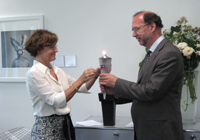
Ambassador Marie-Louise Overvad,
Permanent Representative of Denmark to
the United Nations Office and other
International Organizations in Geneva
presented the MDG3 torch to UNAIDS
Executive Director Dr Peter Piot.
UNAIDS Executive Director Dr Peter Piot received one of the MDG3 Torches on Thursday 26 June in Geneva as part of a campaign organized by the Ministry of Foreign Affairs of Denmark intended to ensure commitment from participants to the third Millennium Development Goal (MDG3): Promote gender equality and empower women.
The campaign, entitled The MDG3 Champion Torch: “To Do Something Extra”, was launched on 7 March 2008 in Copenhagen. In the run-up to the United Nations High-level MDG meeting, which will take place on 25 September 2008, more than 100 Torches in support of the MDG3 are to travel around the world.
Recipients of the MDG3 Torch are representatives from government, private sector, civil society, media, individuals from North and South, and international organizations. Each MDG3 Torch Bearer will commit “To Do Something Extra” in support of gender equality and women’s economic empowerment.
At the UN High-level MDG meeting the collected commitments will be presented to the United Nations Secretary-General Mr Ban Ki-Moon, who will be invited to light the last MDG3 Torch.
Dr Piot accepted the torch on behalf of UNAIDS and committed the organization to make the money work for women and girls by making sure that global financial commitments make a difference at country level.
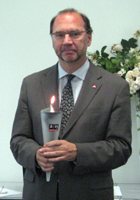
Dr Piot accepted the torch on
behalf of UNAIDS and
committed the organization
to make the money work for
women and girls.
“Achieving MDG6 to halt and reverse AIDS depends on significant progress on MDG3,” said Dr Piot. “While at country level we see significant progress on policy development for gender equity in HIV service provision, it is a major concern that specific budget allocations to back these policies up are generally not there” he added.
Other recipients of the MDG3 torch at the Geneva event were Mary Robinson, former President of Ireland; Graca Machel, Daisy Mafubelu, Assistant Director-General - Family and Community Health, World Health Organization; and Dr. Julian Lob-Levyt, Executive Secretary, Global Alliance for Vaccines and Immunization (GAVI).
On September 25th, the President of the General Assembly Srgjan Kerim and the UN Secretary-General Ban Ki-moon will co-host and chair a high-level event on the Millennium Development Goals in New York. This event will bring together governments, leaders from the private sector, civil society and faith based organizations to review progress made in the preceding 12 months and accelerate action on the MDGs taking stock of progress so far, showcase successes the world could build on, set a path for the future to 2015, and allow each group to make practical commitments.
UNAIDS committed to support the achievement of MD
Feature stories:
2008 High-level meeting on AIDS - Panel discussion 3: Gender equality and AIDS (09 June 2008)
Human rights and gender in HIV-related legal frameworks (28 April 2008)
Women and HIV research (11 December 2007)
Gender and AIDS in the Middle East and North Africa (08 August 2007)
External links:
Official web site of the MDG3 Champion Torch campaign
UN Millennium Development Goals



